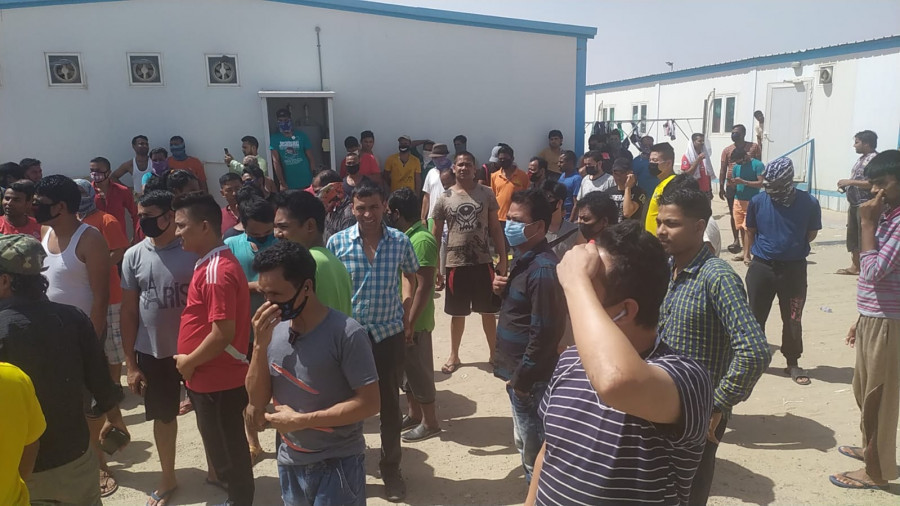National
Nepalis in Kuwait worry for own safety after deaths of compatriots from Covid-19
Three Nepali workers in the Gulf state died after contracting the virus last week.
Chandan Kumar Mandal
Hari Krishna Neupane spent 17 years working in Kuwait and Iraq. He started as a general worker for a Kuwaiti food and beverage company, and working between the two countries, Neupane rose to the position of restaurant manager.
“I worked between 2006 and 2010 in Iraq where the Kuwaiti company had its branches,” said Neupane, now 42. “Every six months, I would return to Kuwait. After years of hard work, I could become a restaurant manager and take care of my families back home.”
But Covid-19 came as a shock to him like tens of thousands of Nepali migrant workers in the Persian Gulf. Neupane lost his job and also contracted Covid-19 in Kuwait last May.
“As I was working in the food and beverage sector, I was laid off,” said Neupane, who later got a job in another restaurant. “I also got infected with Covid-19 and that left me physically weak.”
Before everything would get back to normal in the country, the looming second wave of Covid-19 in Kuwait once again hampered his daily life. It has been three months since the restaurant, where he worked, had only been providing takeaway and delivery.
As the cases of Covid-19 started seeing a surge in Kuwait and his job prospects were again affected, Neupane decided to return home.
On April 9, Neupane landed in Nepal.
“Honestly, I got terrified of the Covid-19 situation and decided to return home. The second wave of Covid-19 is strong and cases have constantly been rising in Kuwait. I could not risk my life again,” said Neupane. “With the first Covid-19 infection, my health has declined. Since last year, my family wanted me to return home after I got infected. Although my visa is still valid, I returned home and won’t go back again.”
As of Thursday, Kuwait has recorded a total of 261,307 cases with a total of 1,482 Covid deaths. The daily cases are fast increasing with over 1000 new Covid-19 cases being recorded every day.
With the cases rising, the safety of Nepali workers in Kuwait, one of the popular labour destinations for Nepalis, has once again become a cause of concern.
The death of three Nepali workers due to Covid-19 last week, in a span of two days, has left Nepali workers further scared of their own safety in the country.
“Of late, the Covid situation has been turning frightening here,” Bishnu Paudel, another Nepali, who is running his recruitment business in the country, told the Post from Salmaiya, some 15-km far from Kuwait City. “While cases have already been rising, the recent deaths of Nepali workers have further left Nepali workers worried.”
Last Thursday [April 15], two Nepalis had died and the following day, another Nepali died from Covid-19 infections, according to Neupane, who is also a journalist and closely follows the developments in Kuwait.
“Two people who died last Thursday were young and physically strong — one was 36 and the other was 42. Last year, at least six Nepalis had died. We’ve heard reports of three more deaths, but that’s not verified,” said Neupane, who is immediate past president of the Kuwait Chapter of the Federation of Nepali Journalists. “The two who died Thursday were popular among Nepalis here and were involved in community activities. These recent deaths have left everyone anxious for their own safety.”
Following the latest surge in Covid-19 cases, the Nepali embassy in Kuwait issued a notice and advised Nepalis there to remain safe by following the safety protocols issued by the Kuwaiti government and other general safety guidelines like wearing masks and avoiding crowded places, among other things.
“We have confirmed that three Nepalis have died from Covid-19 in the last one week,” Rebanta Bahadur KC, third secretary at the Nepali Embassy in Kuwait, told the Post. “Covid-19 cases have been rising in the country. We have asked Nepali workers to remain protected and practice safety guidelines.”
According to KC, the country has currently imposed night-time restrictions on movement in its attempt to contain the contagion.
“Vehicular movement has been prohibited from 7 pm to 5 am,” said KC. “A daily three-hour relaxation on public movement, only for walking outside, has been enforced considering the Ramadan festival.”
However, Nepalis like Paudel find themselves in a fix, mainly because of the rising cases and the compulsion to go to work.
“Covid-19 infections continue to increase in the country and more Nepalis are getting infected. But people like me have no option but to use public transport to go to work,” said Paudel, who reached Kuwait in January after his previous employer terminated his contract in June last year when he was on a vacation in Nepal. “Public transport is crowded during rush hours, especially the last few buses are packed increasing the risk of infections.”
Owing to the Covid-19 restrictions, Nepali workers’ migration to Kuwait, which hosts nearly 70,000 Nepalis, has been halted for more than a year now. Kuwait is among the top-five labour destinations for Nepalis.
What is more scary for the Nepali workers in Kuwait is the overwhelmed health facilities there.
“Nepalis who work on the frontlines like supermarkets and airports among other places were vaccinated,” said Neupane. “While the second wave is making people sick at a faster rate and considered more dangerous, the local hospitals do not admit patients unless they are critical. Many of my infected friends have been relying on bottled oxygen at their apartments.”




 10.12°C Kathmandu
10.12°C Kathmandu














